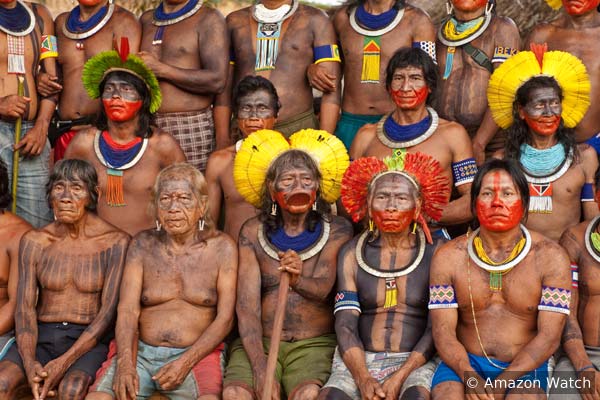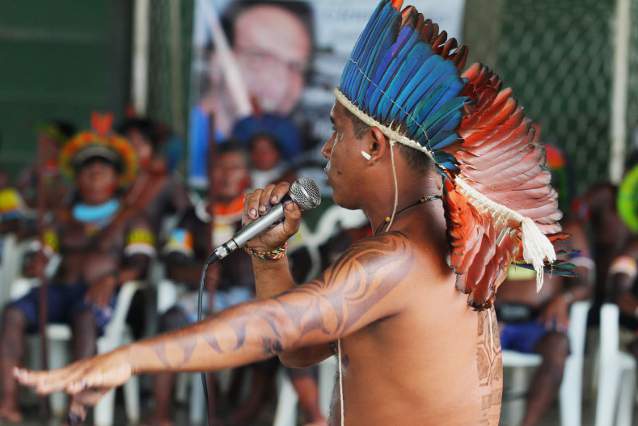Amazon Watch – for the protection of the Amazon Forest and its people
By Denise
Nanni and Milena Rampoldi, ProMosaik. In the following our interview wih Amazon Watch, an important organization
working at the interface between human rights and environment. We would like to
thank Moira for her important information bout her organization and her
strategies and aims.

How was Amazon
Watch founded?
Amazon Watch is a nonprofit organization founded in 1996 to
protect the rainforest and advance the rights of indigenous peoples in the
Amazon Basin. We partner with indigenous and environmental organizations in
campaigns for human rights, corporate accountability and the preservation of
the Amazon’s ecological systems.
What are the
main threats to the Amazon Forest and its people?
indigenous rights, especially land rights.
rainforest is home to nearly 400 distinct indigenous groups. These peoples
depend on the Amazon rainforest for their physical and cultural survival, and
have been its steward for millennia. Indigenous territories (claimed or titled)
comprise more than a quarter of the Amazon basin. Unfortunately, most
rainforest areas currently under threat from unsustainable mega-projects fall
within the traditional homelands of indigenous peoples. Yet, despite their
vital role in the region, Amazonian indigenous organizations have been largely
marginalized from decision-making on economic activities and natural resource
management. Leading researchers now acknowledge that involving indigenous
peoples in land management and recognizing their land rights provides one of
the most effective strategies for stopping deforestation.
Projects
projects drive deforestation, pollution and rights violations in the Amazon
basin. Over the decades, national governments and corporations have erected
dozens of oil and gas projects and hydroelectric dams across the region with no
meaningful safeguards for the fragile rainforest ecosystem or the wellbeing of
the local peoples.
loss of millions of acres of forest as pipelines and oil roads have opened the
way to uncontrolled logging, ranching and colonization. These same projects
have also left a tide of pollution from spills and systematic dumping of toxic
production waters. Massive hydroelectric dams have flooded vast forest areas,
altered the natural flow and health of entire river systems, and devastated the
fish stocks and other aquatic life local peoples depend on for their daily
sustenance.
accountability
multi-national corporations operating in the Amazon basin cause significant
environmental destruction – widespread deforestation and pollution in
particular – while also violating the rights of the local people. Amazon Watch
works to bring these corporations to account for the harms they have caused
while also protecting the rights of those threatened by future projects. Time
and again, corporations have polluted the region in efforts to lower production
costs while maximizing return for shareholders. As corporate revenues grow, the
true costs of these actions can be seen in the sick and dying communities and
devastated environment left behind.
International Financial Institutions for harmful projects
such as dams, road and waterway systems, and oil and gas projects – are major
drivers of deforestation in the Amazon Basin. These large-scale projects
require large-scale funding, and international financial institutions (IFIs)
step into to fill that role. For decades, the World Bank, the Inter-American
Development Bank (IDB) or an export credit agencies such as the U.S. Export
Import Bank were the principle players in backing big projects in South
America. Recently however, regional actors including Brazil’s National Bank for
Economic and Social Development (BNDES) and the Andean Development Corporation
(CAF) are playing an increasing role in funding mega-infrastructure projects.
With billions of dollars in loans going to environmentally devastating
projects, the growing investments by regional banks is especially alarming
given their lack of transparency and accountability, and weak enforcement of
environmental and social safeguards.
is one of the Earth’s best defenses against climate change. The world’s
tropical forests, of which the Amazon is the largest, currently absorb some 20
percent of the carbon dioxide produced from burning fossil fuels. Protecting
the Amazon rainforest – which when cut or burned actually contributes to
climate change – must be a centerpiece of the global efforts to stop climate
change, along with transitioning to clean energy.

usage of media in your area of activity?
important.
In the Amazon region of Brazil, Colombia, Ecuador, and Peru,
Amazon Watch is working directly with indigenous communities to build local
capacity and advance the long-term protection of their lands. In partnership
with communities, non-governmental organizations, concerned shareholders and
citizens, we utilize the following strategies:
Campaign to persuade decision-makers in corporations,
international financial institutions and governments to honor the rights of
indigenous peoples over “development” decisions in their territories
and to rectify past harms, for example in areas devastated by oil drilling.
Through media exposure, legal action and shareholder campaigns we demand social
and environmental accountability.
Strengthen capacity of indigenous communities and partner
organizations in the Amazon to better advocate for their own rights at local,
national and international forums. Through training in legal skills, advocacy,
media and technology as well as the donation of equipment, we help our
indigenous partners assert their collective voice and advance their own vision
for their territories.
Seek permanent protection for threatened areas and
vulnerable indigenous populations in the Amazon rainforest. In partnership with
ally organizations in South America, we champion ecologically sound
alternatives and solutions to industrial and fossil-fuel intensive economic
“development.”
Educate corporate executives, shareholders, public
officials and the general public using media coverage, websites, publications
and documentary films. By building awareness and promoting green economic
alternatives to the current export-oriented development model, we are helping
to bring about a shift within key institutions and society.
to demand for corporate accountabilty? If not, what can be improved by policy
makers?
are rarely held to account for the misdeeds, and are often closely allied with
policy makers in doing so. The case of Chevron in Ecuador is
illustrative.
Ecuadorian Amazon from 1964 to 1990, Texaco – which merged with Chevron in 2001
– deliberately dumped more than 18 billion gallons of toxic wastewater, spilled
roughly 17 million gallons of crude oil, and left hazardous waste in hundreds
of open pits dug out of the forest floor. To save money, Texaco chose to use
environmental practices that were obsolete, did not meet industry standards,
and were illegal in Ecuador and the United States.
one of the worst environmental disasters on the planet. Contamination of soil,
groundwater, and surface streams has caused local indigenous and
to suffer a wave of mouth, stomach and uterine cancer, birth defects, and
spontaneous miscarriages. Chevron has never cleaned up the mess it inherited,
and its oil wastes continue to poison the rainforest ecosystem.
on the run. It has been found guilty by Ecuadorian courts and ordered to pay
$9.5 billion. The company is now running from an international legal dragnet to
force the company to pay for the vast task of cleanup and remediation of the
Ecuadorian Amazon jungle. The Ecuadorians have filed lawsuits in Canada and
Brazil to seek seizure of Chevron’s assets for this purpose, and more lawsuits
in other nations are expected soon.
monitor the trial and protect the judicial process, keep the ongoing fight for
justice in the spotlight, and help coordinate international pressure for Chevron
to do the right thing in Ecuador. The company has engaged in
of law in Ecuador, ranging from the use of deceptive sampling techniques
scientific studies of the contamination, to lobbying efforts in Washington, to
dirty tricks campaigns to contrive a phony corruption scandal and smear the
presiding judge. We have successfully worked with shareholders, consumers,
environmentalists, indigenous rights supporters, and other concerned people to
expose these efforts and keep the heat on Chevron to clean up its toxic legacy in
Ecuador. However, we need continuing support to ensure that 30,000 Ecuadorian
indigenous and
day in court to demand accountability from one of the world’s largest
corporations.
If yes, how?
engagement and pressure campaigns to engage with local authorities and
institutions. We do not receive any kind of funding or other such support from
any government entity or corporation.


